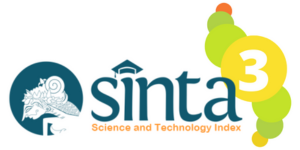PBL-TARL-CRT: INTEGRATING INNOVATIVE APPROACHES TO IMPROVE SCIENCE LEARNING OUTCOMES IN GRADE 8
DOI:
https://doi.org/10.26877/bioma.v13i1.693Keywords:
PBL, TaRL, CRT, Learning Motivation, Learning OutcomesAbstract
This study explores the integration of three innovative learning approaches, namely Problem-Based Learning (PBL), Teaching at the Right Level (TaRL), and Culturally Responsive Teaching (CRT), in improving learning outcomes in Science in grade 8. In education as a pillar of state-building and character-building, these approaches provide a foundation for effective and meaningful learning. PBL places students as agents of learning by providing real challenges, while TaRL adapts learning to students' ability levels, and CRT utilizes students' cultures and experiences for more meaningful learning. An experiment at Junior High School 25 Semarang showed significant improvements in student learning outcomes, learning motivation, and student character. Quantitative analysis confirmed the improvement in learning outcomes, while interviews revealed positive changes in students' learning motivation and character. However, challenges in learning implementation were also shown, including the need to increase diversity in teaching methods, pay attention to students' needs, and create an interactive learning environment. This study shows that the integration of PBL, TaRL, and CRT is promising in improving science learning outcomes and shaping students' characters. However, continuous efforts to improve the quality of learning and the role of teachers are essential to achieving optimal learning goals and creating a bright and characterful generation.
References
Amalia, S., Safrida S, & Ulva, S. M. (2024). Application of Teaching at the Right Level (TaRL) and Culturally Responsive Teaching (CRT) Approach to Increase the Motivation and Learning Outcomes of Students on the Material of Transport through Membranes. Jurnal Penelitian Pendidikan IPA, 10(1), 270–274. https://doi.org/10.29303/jppipa.v10i1.5355
Apriyoanda, H. Y. H. D. M. J. (2023). Penggunaan Pendekatan TARL Terintegrasi Model Pembelajaran PBL Pada Materi Persamaan Reaksi Kimia Sebagai Upaya Meningkatkan Aktivitas Dan Hasil Belajar Peserta Didik. BRENDO EDUKASI - Jurnal Pendidikan , 1(2).
Baharsyah, T., Ika Nurjannah, dan, Teknik, F., Negeri Surabaya Jl Ketintang, U., Gayungan, K., Surabaya, K., & Timur, J. (2023). Pengaruh Model Pembelajaran Problem Based Learning Terhadap Hasil Belajar Siswa Kelas XI TKR di SMK Negeri 1 Jabon.
Banerji, R., & Chavan, M. (2020). A twenty-year partnership of practice and research: The Nobel laureates and Pratham in India. In World Development (Vol. 127). Elsevier Ltd. https://doi.org/10.1016/j.worlddev.2019.104788
Busyairi, A., & Shm Kusuma, A. (2023). The Effectiveness of Problem-Based Learning Model In Improving Critical Thinking Skills in Science Learning: a Meta-Analysis The Effectiveness of Problem-Based Learning Model In Improving Critical Thinking Skills in Science Learning: a Meta. In Kappa Journal (Vol. 7, Issue 1). Pendidikan Fisika FMIPA Universitas Hamzanwadi. http://e-journal.hamzanwadi.ac.id/index.php/kpj/index
Chao, C. Ter, Tsai, C. L., Lin, M. W., Yang, C. W., Ho, C. C., Chen, H. L., Hsu, C., & Sheu, B. C. (2022). Fully digital problem-based learning for undergraduate medical students during the COVID-19 period: Practical considerations. Journal of the Formosan Medical Association, 121(10), 2130–2134. https://doi.org/10.1016/j.jfma.2021.11.011
Clark, D. B., Sampson, V., Stegmann, K., & Marttunen, M. (2009). Scaffolding scientific argumentation between multiple students in online learning environments to support the development of 21st century skills. https://www.researchgate.net/publication/258210582
Creswell, John W. 2014. Penelitian Kualitatif & Desain Riset. Yogyakarta. Pustaka Pelajar
Datreni, N. L. (2022). Model Pembelajaran Problem Based Learning Meningkatkan Hasil Belajar Matematika Siswa Kelas III Sekolah Dasar. Journal of Education Action Research, 6(3), 369–375. https://doi.org/10.23887/jear.v6i3.49468
Desriyanti, R. (2016). PENERAPAN PROBLEM BASED LEARNING PADA PEMBELAJARAN KONSEP HIDROLISI GARAM UNTUK MENINGKATKAN HASIL BELAJAR SISWA. https://doi.org/10.15575/jta.v1i2.1236
Destiranda, E. (2023). Peningkatan Hasil Belajar Peserta Didik Materi Keanekaragaman Hayati melalui Model Problem Based Learning dengan Pendekatan Culturally Responsive Teaching Kelas X SMAN 12 Pekanbaru. 20(1).
Deveci, M., Çiftçi, M. E., Akyurt, İ. Z., & Gonzalez, E. D. R. S. (2022). Impact of COVID-19 pandemic on the Turkish civil aviation industry. Sustainable Operations and Computers, 3, 93–102. https://doi.org/10.1016/j.susoc.2021.11.002
Fahmi Lathif, Y., Pascasarjana universitas negeri semarang, H., & Surel, A. (2019). Persepsi Guru dan Siswa Terhadap Pembelajaran IPA Berpendekatan Stem-R Berbantuan Sholawat Sains.
Febriyanti, N. (2021). Implementasi Konsep Pendidikan menurut Ki Hajar Dewantara. Jurnal Pendidikan Tambusai, 5(1).
Gök, G., & Boncukçu, G. (2023a). The Effect of Problem-Based Learning on Middle School Students’ Environmental Literacy and Problem-Solving Skills. J.Sci.Learn.2023, 6(4), 414–423. https://doi.org/10.17509/jsl.v6i4.62781
Gök, G., & Boncukçu, G. (2023b). The Effect of Problem-Based Learning on Middle School Students’ Environmental Literacy and Problem-Solving Skills. J.Sci.Learn.2023, 6(4), 414–423. https://doi.org/10.17509/jsl.v6i4.62781
Haleem, A., Javaid, M., Qadri, M. A., & Suman, R. (2022). Understanding the role of digital technologies in education: A review. Sustainable Operations and Computers, 3, 275–285. https://doi.org/10.1016/j.susoc.2022.05.004
Ismail, N. S., Harun, J., Zakaria, M. A. Z. M., & Salleh, S. M. (2018). The effect of Mobile problem-based learning application DicScience PBL on students’ critical thinking. Thinking Skills and Creativity, 28, 177–195. https://doi.org/10.1016/j.tsc.2018.04.002
Jauhari, T., Rosyidi, A. H., & Sunarlijah, A. (2023). PEMBELAJARAN DENGAN PENDEKATAN TaRL UNTUK MENINGKATKAN MINAT DAN HASIL BELAJAR MATEMATIKA PESERTA DIDIK. 9(1), 59–74. https://doi.org/10.18592/ptk.v%vi%i.9290
Jumadi, J., Perdana, R., Riwayani, & Rosana, D. (2021). The impact of problem-based learning with argument mapping and online laboratory on scientific argumentation skill. International Journal of Evaluation and Research in Education, 10(1), 16–23. https://doi.org/10.11591/ijere.v10i1.20593
Keiler, L. S. (2018). Teachers’ roles and identities in student-centered classrooms. International Journal of STEM Education, 5(1). https://doi.org/10.1186/s40594-018-0131-6
León, B., Fernandez-Rio, J., Rivera-Pérez, S., & Iglesias, D. (2021). Cooperative Classrooms and Academic Performance in Physical Education: A Multilevel Analysis. Journal of Teaching in Physical Education, 1–9. https://doi.org/10.1123/jtpe.2021-0008
Lestari, N. A., Jatiningsih, B., Hamidah, L., & Savitri, E. N. (2022). PENINGKATAN KETERAMPILAN KERJASAMA PESERTA DIDIK KELAS VII F SMP NEGERI 9 SEMARANG MELALUI MODEL PROBLEM BASED LEARNING BERPENDEKATAN CULTURALLY RESPONSIVE TEACHING.
Lutfi Alhadi, M., Yuliastrin, A., Vebrianto, R., Sultan, U., & Riau, S. K. (2023). The effect of hybrid learning-based I-book media to improve language literacy in elementary schools. Jurnal Penelitian Ilmu Pendidikan, 16(2), 84–91. https://doi.org/10.21831/jpipfip.v16i2.57715
Maryono, A., Pengajar, S., Teknik, F., & Mada, U. G. (2021). KAJIAN LEBAR SEMPADAN SUNGAI (STUDI KASUS SUNGAI-SUNGAI DI PROVINSI DAERAH ISTIMEWA YOGYAKARTA) A Study Of Stream buffer Width (Case Study of Rivers in Daerah Istimewa Yogyakarta Province).
Méndez, J. E. (2021). Prinsip-Prinsip Wawancara yang Efektif untuk Investigasi dan Pengumpulan Informasi. www.wcl.american.edu/impact/initiatives-programs/center/
Muafiah, A. (2020). ANALISIS MOTIVASI BELAJAR DAN HASIL BELAJAR DARING MAHASISWA PADA MASA PANDEMIK COVID-19. http://journal.unismuh.ac.id/index.php/jrpd
Ningrum, M. C., Juwono, B., & Sucahyo, I. (2023). Implementasi Pendekatan TaRL untuk Meningkatkan Motivasi Belajar Peserta Didik pada Pembelajaran Fisika. PENDIPA Journal of Science Education, 2023(7), 94–99. https://doi.org/10.33369/pendipa.7.2.94-99
Pallant, J. (2016). SPSS survival manual : a step by step guide to data analysis using IBM SPSS.
Renninger, K. A., & Hidi, S. E. (2016). Book Review: The power of interest for motivation and engagement. In ISSN THE TESOLANZ JOURNAL (Vol. 2020). https://www.researchgate.net/publication/347987292
Robi, F. S., Dianti, R., & Handayani, N. R. (2023). Improving cognitive learning outcomes and communication skills through problem-based learning with lesson study. Jurnal Penelitian Ilmu Pendidikan, 16(2), 144–153. https://doi.org/10.21831/jpipfip.v16i2.60041
Seraj, M., Khan, O., Khan, M. Z., Parvez, M., Bhatt, B. K., Ullah, A., & Alam, M. T. (2022). Analytical research of artificial intelligent models for machining industry under varying environmental strategies: An industry 4.0 approach. Sustainable Operations and Computers, 3, 176–187. https://doi.org/10.1016/j.susoc.2022.01.006
Taher, T. (2023). Analisis Keterampilan Komunikasi dan Kolaborasi Siswa Introvert dengan Pendekatan Culturally Responsive Teaching. Jambura Journal of Educational Chemistry, 5(1). http://ejurnal.ung.ac.id/index.php/jjec
Utari, R. (2023). Indonesia high school teacher’s organizational citizenship behavior. Jurnal Penelitian Ilmu Pendidikan, 16(2), 116–123. https://doi.org/10.21831/jpipfip.v16i2.61004








